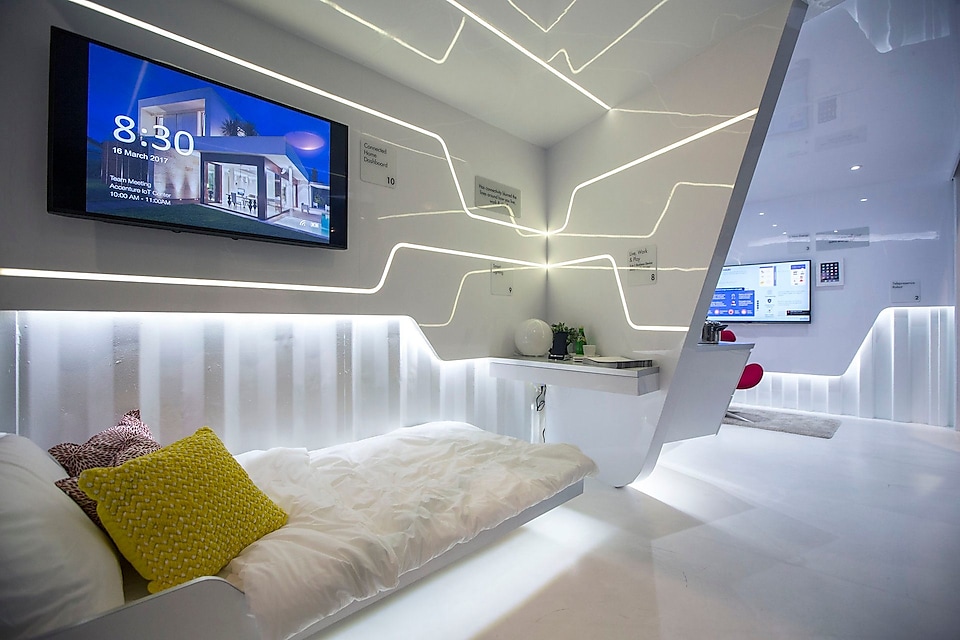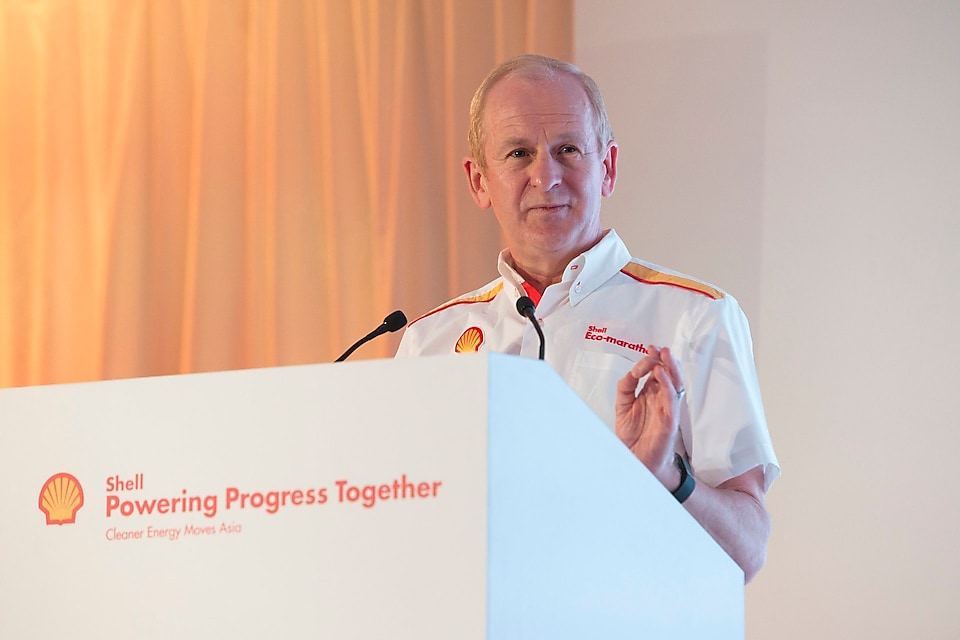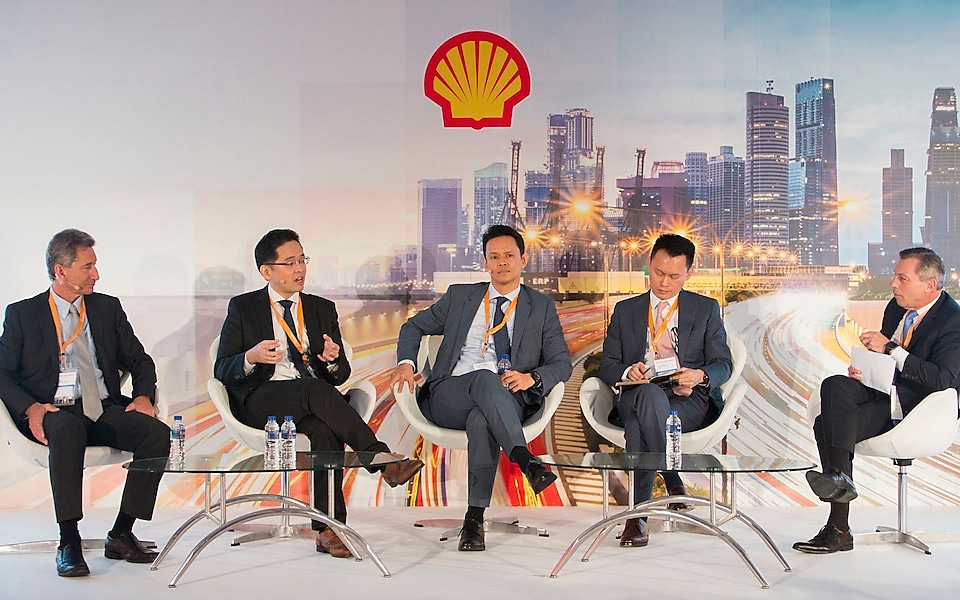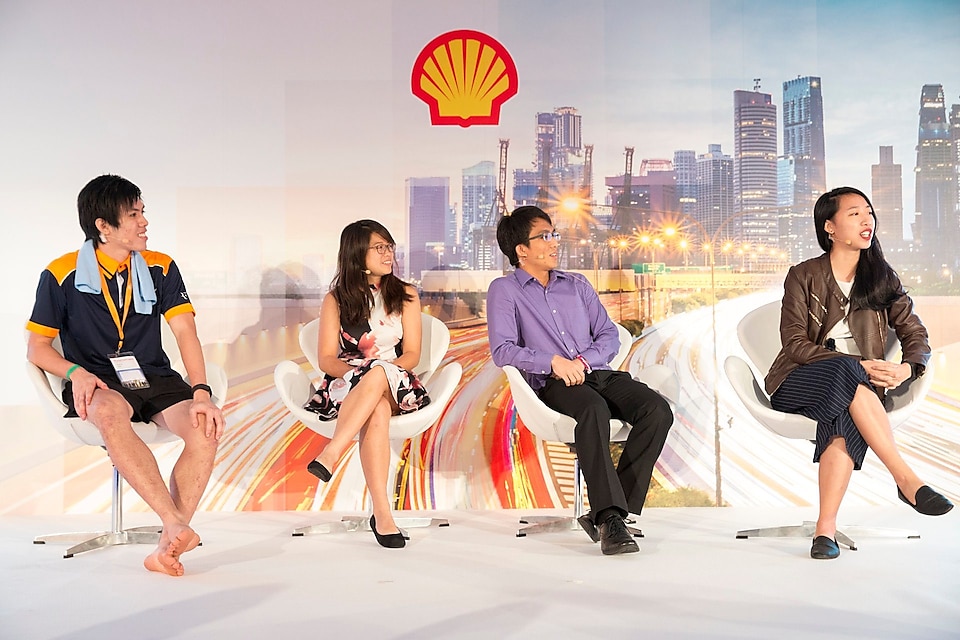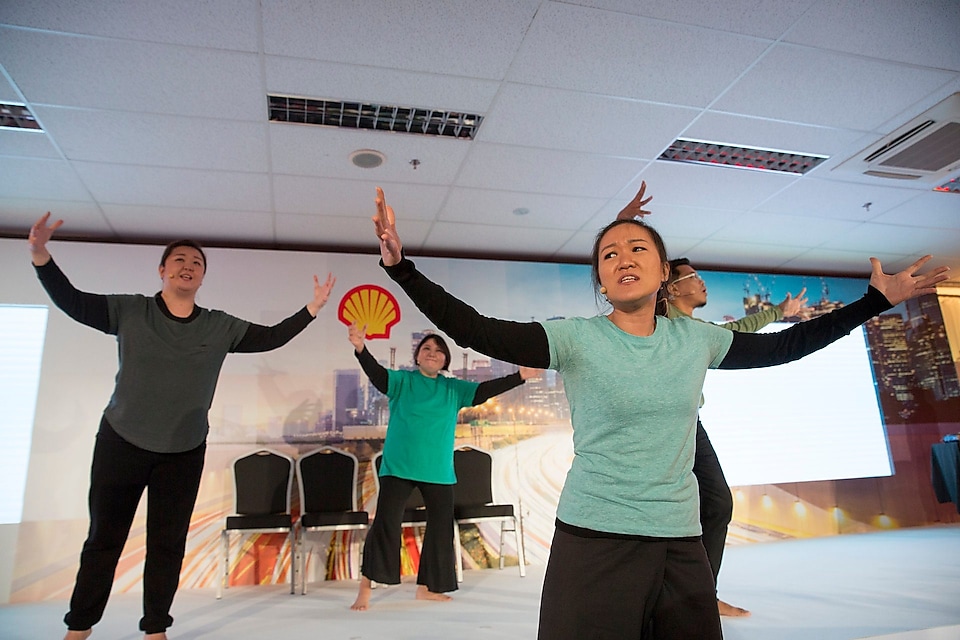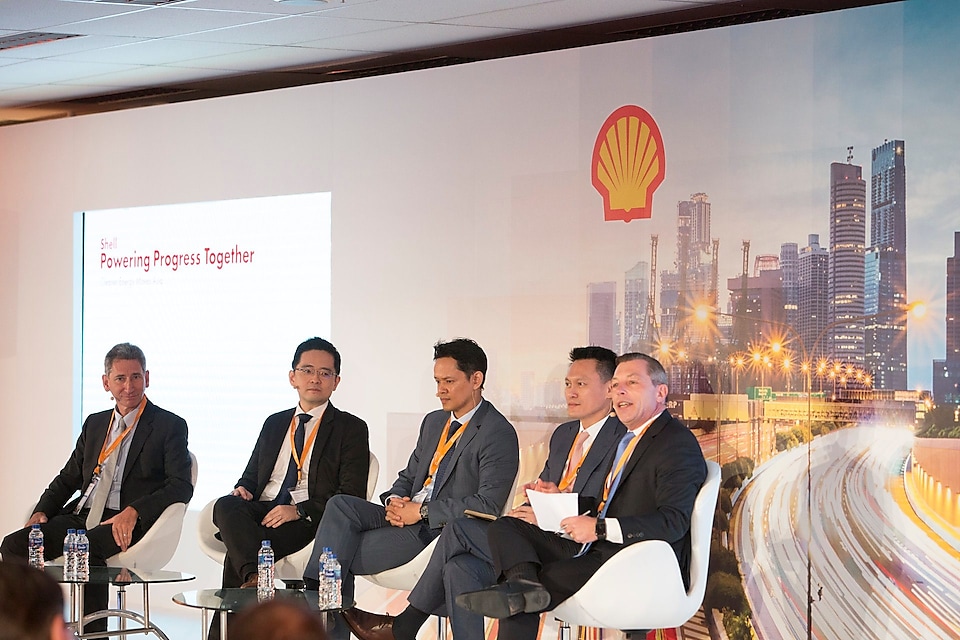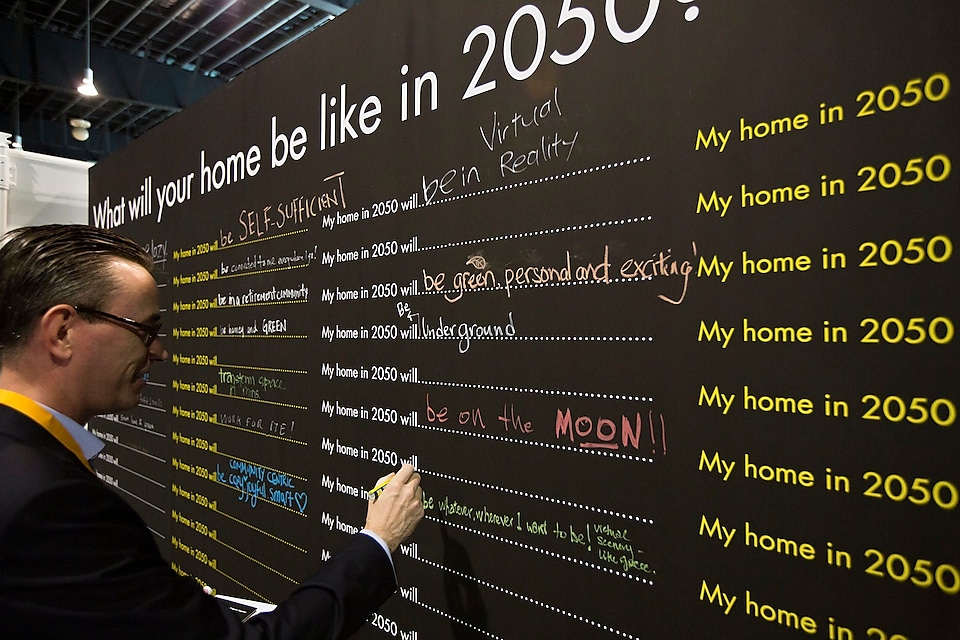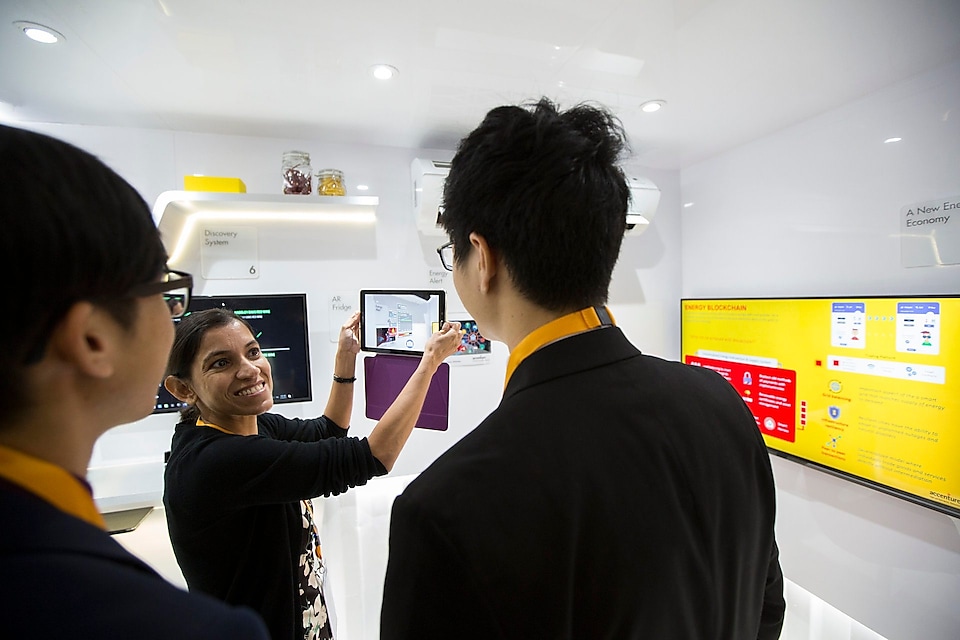Title: Shell Powering Progress Together
Duration: 4:46 minutes
Description:
Highlights of the Powering Progress Together forum from Make the Future Asia 2017
Shell Powering Progress Together Transcript
[Background music plays]
Shell music
[Text displays]
Make The Future
Singapore 2017
[Video footage]
Make the future event footage
[Dialogue: Mark Gainsborough]
The world needs significantly more energy
[Video footage]
SOT of Mark Gainsborough
[Dialogue: Mark Gainsborough ]
There are billions of people on the planet that don't yet have access to energy
[Video footage]
Event footage of audience
[Text displays]
16 March 2017
Singapore
[Video footage]
Gardens by the bay
[Text displays]
Powering Progress Together
[Video footage]
Interview with Mark Gainsborough
[Dialogue: Mark Gainsborough ]
Powering Progress Together is all about exploring how we can make the future together.
[Video footage]
Timelaspe shot of event space
[Dialogue: Mark Gainsborough ]
We're going to have to do it
by working in partnership
with many many other people. If we're going to make the future successful.
[Video footage]
Event footage of exhibition area
[Video footage]
Smiling faces
[Text displays]
The Forum
[Background music plays]
Music change to a slower piece
[Video footage]
Audience and guests at the PPT presentation
[Text displays]
A cross section of society
Engage and exchange ideas
[Text displays]
More and cleaner energy
change the way we
live, work and play
[Video footage]
Exhibition area
[Dialogue: James Chong]
Consumers globally want to do the right thing.
[Video footage]
Interview with James Chong
[Title]
James Chong
Managing Director
Digital Transformation, Accenture
[Dialogue: James Chong]
And energy consumption is a hot topic because it's depleting some of the natural resources that we care very much about. But at the same time our lifestyle, that require energy.
[Video footage]
Container of Possibilities
[Text displays]
Listen
Learn
Collaborate
[Background music plays]
Music change to a faster, tension piece
[Text displays]
Groundbreaking solutions to
Asia's cleaner energy dilemma
By industry leaders
[Video footage]
SOT of Visal Leng
[Dialogue: Visal Leng]
In general, cleaner energy is more expensive than traditional energy. We are working very hard on lowering the costs.
[Title]
Visal Leng
President, Asia Pacific
GE Oil & Gas
[Video footage]
SOT of Koh Kong Meng
[Title]
Koh Kong Meng
General Manager & Managing Director
South East Asia & Korea, HP INC
[Dialogue: Koh Kong Meng]
We look very seriously at the materials we use. The provenance of these materials, where they come from, are they from conflict zones or not. All the way down to how we actually use our energy.
[Text displays]
Imagine
[Video footage]
SOT of Dr. Alvin Yeo
[Title]
Dr. Alvin Yeo
Director, Industry Development
Energy Market Authority
[Dialogue: Dr. Alvin Yeo]
There's an opportunity for us to push a lot more research innovation, energy storage system, solar forecasting.
[Text displays]
Explore
[Video footage]
Interview with Goh Swee Chen
[Title]
Goh Swee Chen
Chairperson
Shell companies in Singapore
[Dialogue: Dr. Alvin Yeo]
The problem is a complex one and we can't do this on our own.
[Text displays]
Together
[Video footage]
Interview with Tiah Cherng Yew
[Title]
Tiah Cherng Yew
Imagine the future competition winner
Nanyang Technological University
[Video footage]
Speakers on stage for photo taking.
Guests mingling in the room.
[Dialogue: Tiah Cherng Yew]
If all the countries can come together, we can come up with a more efficient energy generation and energy distribution system. We can harness on the energy that we can get from all the different places.
[Text displays]
Building a cleaner future for our planet
[Background music plays]
Music change
[Video footage]
Interview with Koh Kong Meng
[Dialogue: Koh Kong Meng]
I may not be here in 50 years but definitely my children, my grandchildren will be around. And we need to be able to give them a sustainable environment for them to be able to live in.
[Text displays]
The first-ever
Imagine the future
Scenarios competition
[Background music plays]
Music change to more upbeat, light hearted
[Text displays]
Millennials
Imagine
Asia's energy future
[Video footage]
SOT of Danny
[Dialogue: Danny Soo]
My name is Danny, form a divergent world in 2050.
[Video footage]
SOT of Victoria
[Dialogue: Danny Soo]
I'm Victoria. I am from convergent world in 2050.
[Text displays]
See how
People in Asia
Could
Live
Work
Play
In 2050
[Dialogue: Marc Carrel-Billiard]
In 2050, what's going to be the new world, how they going to live energy. How they going to consume it. That play was done by millenniums
[Video footage]
Interview with Marc Carrel-Billiard
[Text displays]
Living in a self-sustaining divergent world
[Video footage]
SOT of Danny Soo and Amber Tan on stage
[Dialogue: Amber Tan]
I'm curious Danny. How do you travel in 2050?
[Dialogue: Danny Soo]
Nah, travelling is not cool in 2050's divergent world.
[Title]
Danny Soo
Imagine the future competition winner
Nanyang Technological University
[Title]
Amber Tan
Imagine the future competition winner
Nanyang Technological University
[Video footage]
Clips of different virtual reality situations
[Dialogue: Danny Soo]
Absolutely everything can be done in virtual reality. Even dating!
[Dialogue: Danny Soo]
The most interesting concept I had was this idea of the world
[Video footage]
Interview with Mark Gainsborough
[Dialogue: Mark Gainsborough]
where actually most things happen virtually rather than real life.
[Background music plays]
Music change to a light hearted piece
[Video footage]
SOT of Danny Soo
[Video footage]
Danny with drone, simulating online shopping
[Dialogue: Danny Soo]
In the event I need to buy anything for the day I just need to go online. Click my groceries or whatever I need to buy and it'll get delivered instantly.
[Text displays]
Living in a
Collaborative
Convergent world
[Dialogue: Danny Soo]
We can use solar energy to do some really cool stuff such as charge our electrical vehicles.
[Video footage]
Charging of vehicle
[Dialogue: Danny Soo]
Recycle our waste water and turn plastic into 3D printing materials.
[Video footage]
Solar panels
[Dialogue: Danny Soo]
So we are creating these smart communities where you can live in harmony with the environment.
[Text displays]
Smart living
In 2050
[Text displays]
Container of Possibilities
[Dialogue: Amber Tan]
This is what our future homes could look like in 2050.
[Video footage]
Interior of container of possibilities
[Dialogue: Amber Tan]
Everything in your home is smart and is connected. Not only is it more energy efficient, you can also monitor and control it form wherever you are.
[Text displays]
Cleaner energy
Moves Asia
[Video footage]
Interview with Goh Swee Chen
[Dialogue: Goh Swee Chen]
Powering progress together is important because it is a venue for us to bring people with bright ideas together
[Video footage]
PPT speakers on stage
[Dialogue: Goh Swee Chen]
To discuss, debate, engage
[Text displays]
Discuss
Debate
Engage
[Video footage]
Man drawing on the white paper
[Dialogue: Goh Swee Chen]
On an important topic of delivering more energy and cleaner energy.
[Background music plays]
Music change to Shell music
[Video footage]
Event footage of children at exhibition area.
[Video footage]
Interview with Goh Swee Chen
[Dialogue: Goh Swee Chen]
It's the first time we are bringing the festival together.
[Video footage]
PPT skit/play by millennials
[Dialogue: Goh Swee Chen]
There was just so much energy in the room.
[Text displays]
Connect
[Video footage]
Interview with Visal Leng
[Dialogue: Visal Leng]
I look at this event, bringing people from small children all the way to professionals with 20, 30 years of experience.
[Video footage]
Exhibition interaction
[Dialogue: Visal Leng]
The span and the breadth of it is fantastic.
[Text displays]
Collaborate
[Video footage]
Interview with David Chen
[Dialogue: David Chen]
Seeing Shell pushing forward in efforts into cleaner energy gives us a really good feeling about the future.
[Text displays]
Hope
[Video footage]
Interview with James Chong
[Dialogue: James Chong]
I'm very hopeful of the future as it relates to how technology can help us build a sustainable future
[Video footage]
Exhibition cutaways and interaction
[Video footage]
Interview with Amber Tan
[Dialogue: Amber Tan]
I realised that the future is a lot closer than we think it is. We are going to be the ones that are going to determine and bring the future, like make it a reality.
[Text displays]
Reality
[Video footage]
Interview with Koh Kong Meng
[Dialogue: Koh Kong Meng]
I'm a lot more optimistic today than I was even yesterday
[Video footage]
Children having fun at the exhibition area
[Dialogue: Koh Kong Meng]
Thinking about being sustainable and I think this is a wonderful thing.
[Video footage]
Young people shouting to the camera
[Dialogue: Koh Kong Meng]
Make the future Singapore!
[Text displays]
Make The Future
Singapore 2017
[Shell Pecten Logo]
[Text displays]
Get inspired to #makethefuture
#poweringprogress
[Audio]
Shell mnemonic
